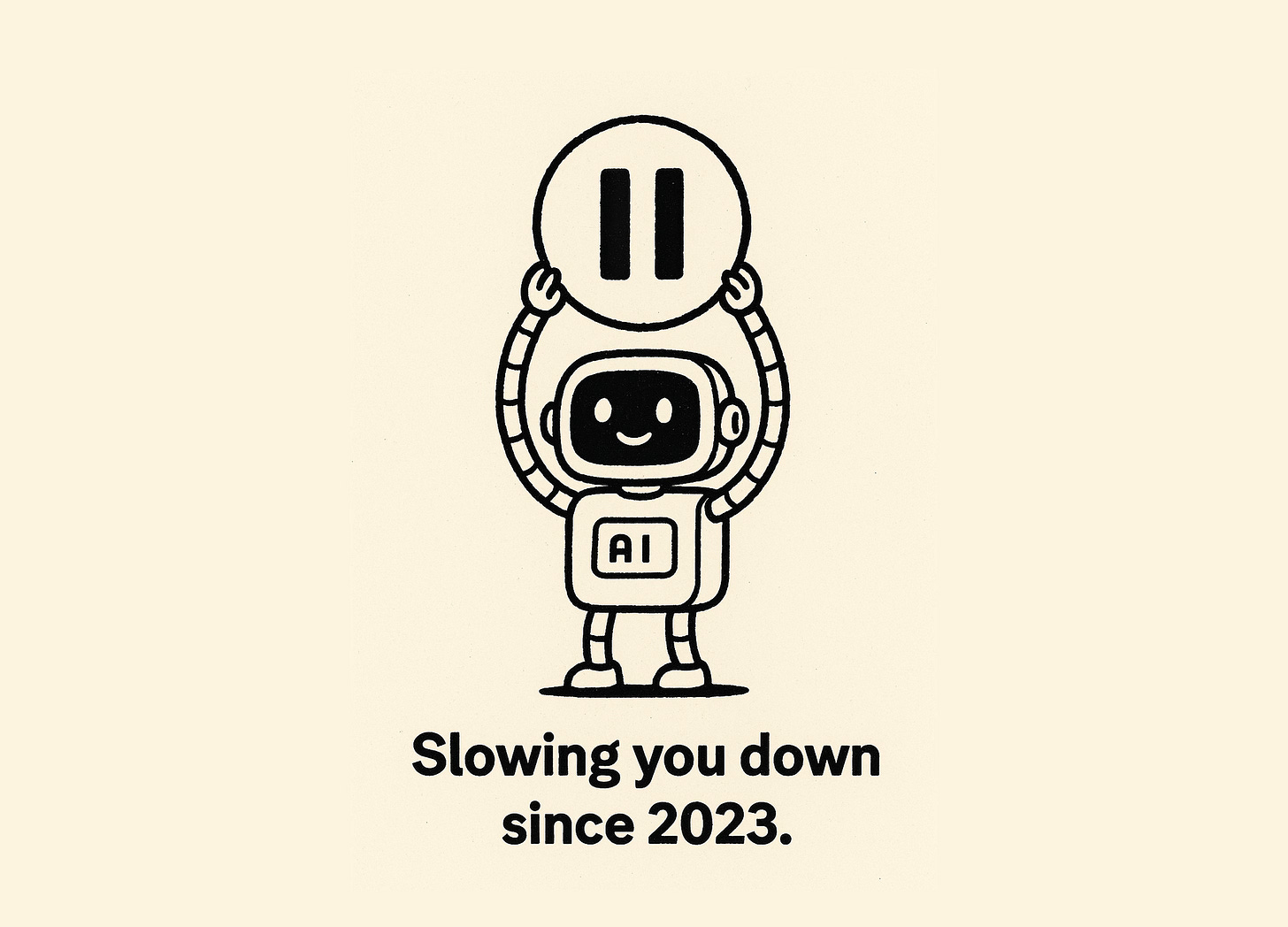Everyone talks about how AI speeds things up. But sometimes the best thing it does is force you to stop.
A few weeks ago, I was deep into coding an app. I was on a roll, having a great time, working on finalising the last few features with the plan of launching it a few days later. Suddenly I hit the wall: I’d run out of usage credits. Vibe killed.
At first I felt frustrated. I was so close and now I was going to have to wait a few hours before I could keep going. I wanted to get it done while I had the momentum.
But the pause ended up being a good thing. Without AI filling the gaps, feeding me constant dopamine as my ideas started to come to life, I had to ask myself: Is this project really worth building right now?
That forced slowdown saved me from spending the rest of my weekend polishing something that didn’t matter as much as I thought it did in the moment.
The default narrative: AI = speed
AI is pitched as acceleration: 10x faster launches, one-click drafts, instant answers. Productivity gurus love screenshots of “3 hours saved per day.”
But here’s the problem: speed in the wrong direction isn’t progress. It’s just waste, faster.
And that’s why some of my most valuable learning moments with AI have been the ones where it slowed me down.
When AI Gives You Too Much
When GPT-5 came out, I got excited. I decided to write a post about it. For once, I went in with a proper structure (created with help from AI). I was feeling confident. Too confident…
What should have taken a few hours ballooned into days. I went down research rabbit holes, editing, re-editing… until I’d lost track of the point.
So I threw all my notes into ChatGPT and asked it to shape them into a draft. It happily obliged, creating a clean, well-structured piece. At first glance, it looked solid. But the more I read, the more it felt flat. Boring.
I spent hours polishing, rewriting, even convincing myself I finally had something publishable. But deep down, I knew it wasn’t right.
The clarity came later, lying in bed with no laptop or AI. In the quiet, the real point crystallized in my head. I grabbed my phone, dumped it into notes, and the next morning shaped it into a piece I was actually proud of.
Sometimes the gift of AI is not acceleration. It’s the friction that shows you the work wasn’t ready.
The 3 Types of Slowdown
So far I’ve seen three flavors of slowdown with AI.
Overproduction slowdown
When AI gives you too much, or is too generic. Adds work instead of value.
Stepping away helps give clarity and perspective.
Scarcity slowdown
When the tool stops working. Credits run out, servers are down, whatever.
Frustrating at first, but the pause forces you to ask: is this worth pursuing without AI?
Deliberate slowdown
When you use AI not to answer, but to challenge your thinking. Ask it to argue or critique - this is my favourite way of slowing down and having productive conversations with AI.
This kind of intentional friction is often where the real breakthroughs come from.
Isn’t this just bad prompting?
Some will say: “But that’s just a problem of using the tool wrong.” Maybe. Better prompts can avoid generic drafts. Paying for more credits avoids hard stops.
But I think that misses the point. Sometimes it’s exactly those moments of friction, where the AI isn’t smooth, that are the most valuable.
Sometimes the friction is the feature. It breaks autopilot mode. It stops us from doing more busy work.
The real skill here isn’t about doing more, it’s judgement. Knowing when to go fast and when to slow down. AI can help accelerate execution, but pauses help sharpen decisions.
Where to embrace slow AI
A few places where leaning into slowdown has helped me:
Problem definition: If AI is making it too easy to skip ahead, stop. Spend more time on the question.
Trade-off analysis: Ask AI to argue against you, not just agree.
Work that feels “too easy”: If it spits out a shiny output in seconds, pause. Does this actually matter?
Instead of resenting those moments of slowdown, I’ve started treating them as checkpoints.
The real value of slowness
AI isn’t just changing how fast we work. It can change when we pause.
And those pauses, whether accidental or intentional, might be where the best decisions happen.
TL;DR:
AI slowing you down is often a feature, not a bug.
Three types: overproduction, scarcity, deliberate.
Use those pauses as checkpoints for judgment, not annoyances.
Where has AI made you slower in a way that helped? Hit reply — I’d love to hear more stories of “productive friction.”



Love this framing, Katrina. The idea that friction is a feature really resonates. I’ve noticed the same thing: when AI makes something feel too easy, I sometimes charge ahead without asking if it’s actually worth doing. Those pauses you describe often create the space where the deeper insight shows up.
I especially like your point that the real skill isn’t speed but judgment. That’s such a refreshing counterbalance to the “10x productivity” narrative..
Curious. Do you have a personal ritual for leaning into those slowdown moments (like a walk, journaling, etc.), or do you just let them happen naturally?
With ya. Most of the time, I don't try to complete things faster using AI. I try to do better in roughly the same amount of time.
The world is already awash in mediocre-or-worse.